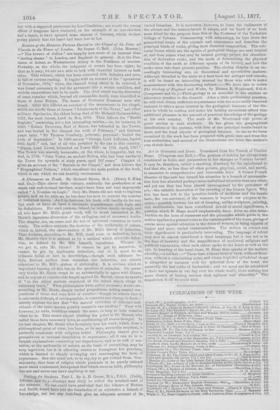Art in Ornament and Dress. Translated from the French of
Charles Blanc. (Chapman and Eall.)—Tho goddess of fashion has always been considered as fickle stud purposeless in her changes as Fortuna herself. It may be, therefore, rather a startling discovery for the uninitiated to find that she, no loss than all other powers, physical, sacial, and moral, is amenable to comprehensive and inexorable laws. A former French director of fine-arts has turned his attention to a branch of ornamenta- tion that has absorbed perhaps more individual attention than any other, and yet one that has been almost unrecognised by the professors of art, —the suitable decoration of the covering of the human figure. Why this has been loft to the 'prontico-bands of modistes and the innate taste, the vise-sentiment, of the wearers, is beyond our purpose to in- quire,—possibly because the art of dressing, unlike sculpture, painting, and architecture, Las been considered devoid of moral significance, a position which M. Blanc would emphatically deny. After an able intro- duction on the laws of ornament and the principles which guide it, the author applies the general rules to the various parts of the dress, giving of course more special attention to the dress of women, as being capable of higher and more varied ornamentation. The section on colours and their significance is particularly interesting. The language of colour may now be almost considered a dead language, but it was not so in the days of heraldry and the magnificence of media3val religious and political ceremonies, when each colour spoke to the heart as well as the eye. In treating of the head-dress, M. Blanc thus speaks of the modern atrocity,—a tall hat :—" These hats without front or back, 'without direc- tion, without a culminating point, and whose frightful cylindrical shape is altogether at variance with the spherical form of the head, are assuredly the last relics of barbarism ; and we must not be astonished if their use spreads in our day over the whole world, since nothing has more chance of lasting success than ugliness and absurdity." The translation is all we could wish.






























 Previous page
Previous page